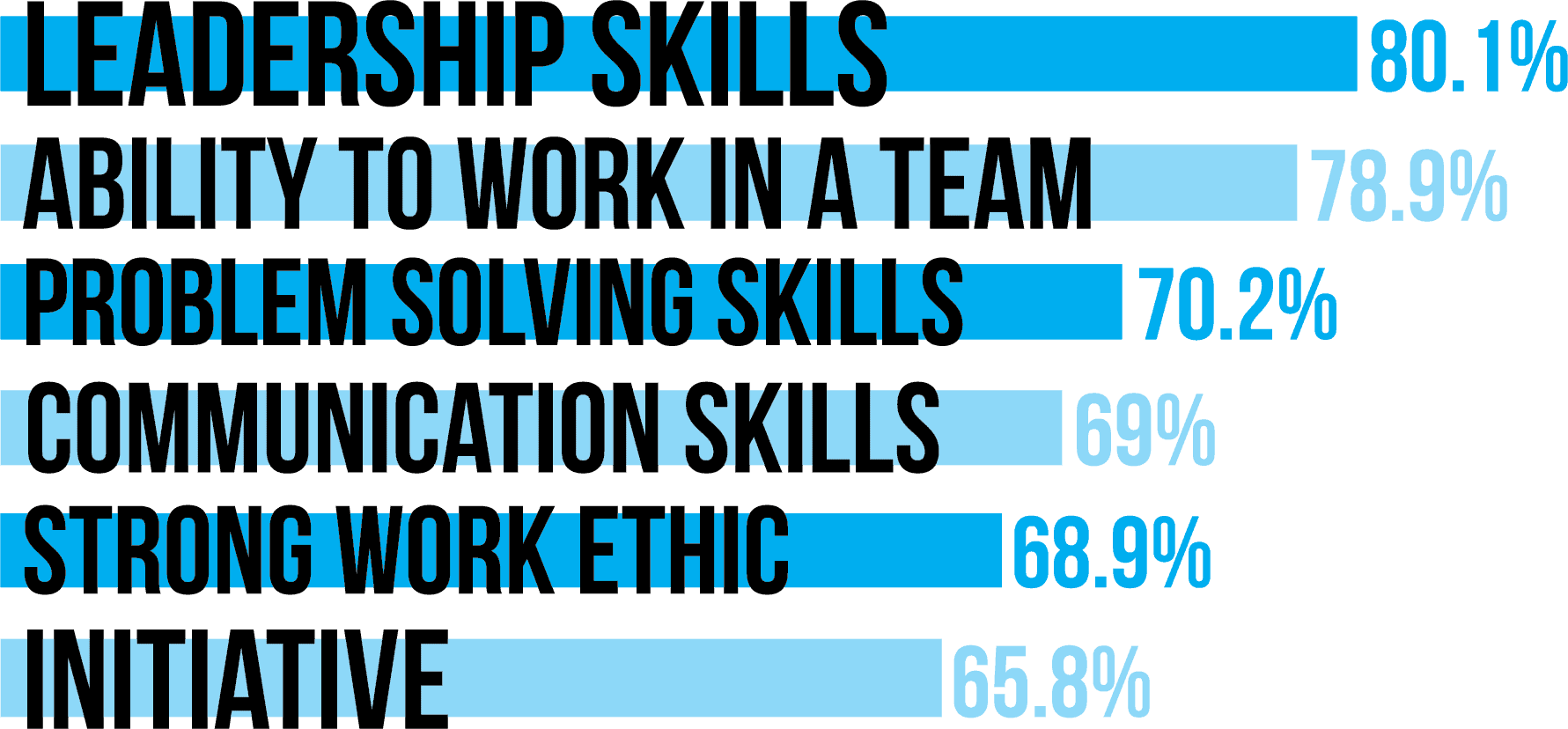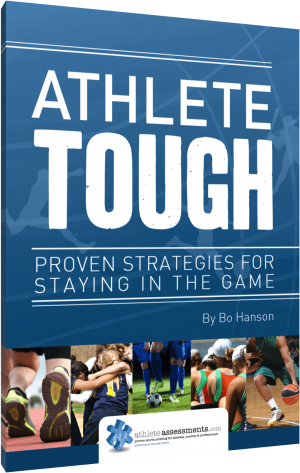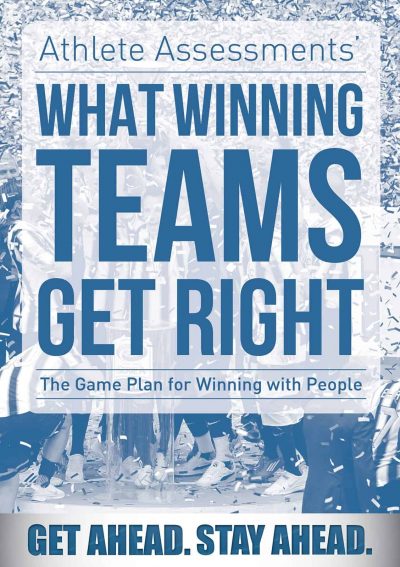And, do College Graduates Want to Develop it? Yes!
What is it that makes one college graduate stand out from their peers? And what do employers want more than any other skill when they are recruiting staff? According to the 2016 National Association of Colleges & Employers Job Outlook survey, the answer is leadership, team work and communication. Skills that leading universities are ensuring their students have by the time they graduate.
When you look at these statistics, and the fact that more than 80% of employers said they were looking for evidence of leadership skills on the candidate’s resume, and nearly as many looked for indications that the candidate can work in a team, you know it is imperative to get these aspects right before sending your graduates out into the workforce.
What really matters?
The 2016 National Association of Colleges and Employers Study shows employers want job candidates to have these six skills and abilities more than any others:

Leadership skills – 80.1%, Ability to work in a team – 78.9%, Problem solving skills – 70.2%, Communication skills – 69%, Strong work ethic – 68.9%, Initiative – 65.8%.
Students are also seeking the opportunity to learn these skills with the survey stating that 6 out of 10 millennials felt underutilized and believed they were not being developed as leaders when they entered the workforce.
So what can you do to ensure your students are ready to embark on their professional careers post-graduation? How can you develop their ability to work well both independently and in a team? And what can you do to assist and motivate your students to reach, or hopefully, exceed their potential?
In today’s competitive world the challenge continues to be balancing academics with real-world demands and preparing student for what’s ahead. It is developing and enhancing key skills and the people side of business because inevitably, this is what separates candidates and makes the difference between getting the job or missing out.
St. John’s University (NY) Assistant Professor, Dr. David P. Hedlund said that educators had an ethical and moral obligation to provide their students with all the tools necessary for success in the competitive industry of sports.
“Educators must strive to provide students with both knowledge and professional skills, balancing academics with the real-world,” Dr. Hedlund said.
“Sport Management is an applied field and the ultimate goal is to prepare students for careers post-graduation. This includes skills that deliver success in the workplace such as written and oral communication skills, how to influence and work with others, and leadership.”

Today, it is different for the students going through university and their skill set is not the same as previous eras.
This generation of students has grown up in an era unlike any other. They often don’t arrive at university with strong leadership experiences and well developed interpersonal skills.
The structured environment they have come from hasn’t demanded these skills or provided an opportunity to develop them. A significant leadership gap exists that needs to be addressed.
The good news is it is something we can be proactive about. Leadership is no longer seen as something you are born with but rather a skill that can be developed and grown. The great news is that millennial students want to develop leadership skills too.
Many of the top Universities are investing their time and energy in developing vital interpersonal skills through the use of Athlete Assessments’ services. Two key areas are with our Student-Athlete Leadership Program that is utilized within Athletics Departments and the University Academic Program which is utilized within Sport Management, Sport Psychology, Coaching and other Sports related Faculties.
What both Programs have in common is that leadership and interpersonal skill development starts with an understanding of self. And this is where Athlete Assessments’ DISC Profiles come into play, as they are recognized as the leading tool to use in developing self-awareness and are also the only DISC Profiles specifically designed for sport.
About DISC Profiling in Sport
DISC profiling
has been a common tool used within the corporate sector for management and leadership development for over 30 years. Athlete Assessments is the only worldwide provider of DISC Profiling in Sport with the AthleteDISC, CoachDISC and Sports ManagerDISC Profile Assessments. Through knowing and understanding the information in their personalized DISC Profile Report, an individual can build the self-awareness they need, as an athlete, team member, coach, manager or leader to make a step change in their personal performance and how best to contribute their strengths for the benefit of those around them. Read more about DISC Profiling in Sport here.
“The aim of incorporating the Sports ManagerDISC Profile into Sport Management classes is to give the students a step up, an unfair advantage in the tough employment market,” said Athlete Assessments’ Bo Hanson.
“Unless you are getting the people side of business right, you are missing out on a massive competitive edge,”
“Where so many other factors in business are similar, just as it is in sports, it is how well the people side is managed that differentiates the mediocre and truly great and this is where DISC behavioral profiling comes in.”
Real Life Success Story

Natasha Miller was studying a Masters degree program in Sport Management at St. John’s University (NY) when she completed the Athlete Assessments Sports ManagerDISC Profile in a Sports Management class with Dr. David Hedlund.
After graduating from St. John’s University, Natasha was applying for roles and found her experiences in Dr. Hedlund’s class made all the difference.
“I felt confident and prepared because of my knowledge of the DISC Assessment. I believe it gave me a notch up above the other candidates… I found that I already knew my worth and value because of the assessment. I felt confident in applying for different positions because I better understood my own strengths and weaknesses.”
You can read more about Natasha’s story in our article “Knowing your DISC Profile gives Job Seekers the Professional Edge”.

Identifying Ideal Career Options for after Graduation and after Sport
Last year, Athlete Assessments released an additional option on our DISC Profile Reports, called the Career Management Report. It was developed to directly assist in the transition from university or full-time sport (professional or elite athletes) to employment prospects after sport, and designed to contribute to future career planning and success.
While the initial focus of this report was to assist athletes in their transition from sport to the workplace, we have found that the application is much broader. This is because finding your career direction begins in defining a critical element – your behavioral style. And that’s what DISC does.
Research suggests that specific behavioral styles are attracted to and suited to specific jobs and careers. By knowing your natural and adapted behaviors, and by truly understanding your strengths and even your weaknesses, you can better equip yourself to finding the right job match.
The Career Management Report takes the individual’s DISC Profile and maps it to potential careers that best suit their behavioral style. It also links with the O*Net website (data from the US Department of Labor) providing a list of careers and job codes to get a detailed understanding of the role, qualifications needed, daily tasks and job description, whether it is a growing industry and much more.
Now, no matter which DISC report you complete (AthleteDISC, CoachDISC or Sport ManagerDISC), it can be accompanied by this additional nine page Career Management Report.
Career satisfaction, happiness, and success are possible – if you know how to make it happen! With your personalized and comprehensive DISC Profile Report and our Career Management Report, you have the right tools to help you understand how behavioral styles gravitate to certain jobs and how you can become more effective in making informed decisions for your career management.
Where to from here?
If you’ve enjoyed this article, you may also be interested in another recent Leadership article “Taking the Confusion and Mystery out of Leadership Development”.
At Athlete Assessments, we’re here to provide you with excellence in service and here to help you be your best. Find out more about our:
If there is anything we can assist you with, please Contact Us.






